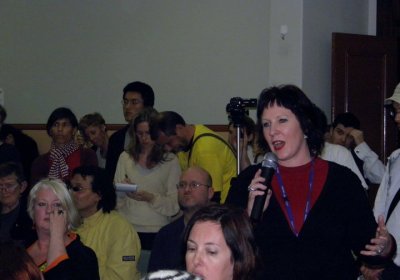The development of the coal seam gas (CSG) industry brings risks to Australia’s limited water resources. It draws contaminated water out of the ground, damages aquifers and uses and pollutes large quantities of freshwater. These risks, and the implications for health, agriculture and the environment, are central reasons for the growing community campaign to stop CSG mining. Images in the documentary Gasland of people setting their tap water on fire have made many question the impact of unconventional gas on water supplies.
Mining
Toro Energy has submitted an application to build Western Australia’s first uranium mine, at Wiluna, the start of WA’s iconic Canning Stock Route.
The debate over the proposed mine has far-reaching ramifications. The construction of WA’s first uranium mine is likely to be the “thin edge of the wedge”, whereas a strong show of public opposition can significantly increase the likelihood of keeping WA uranium-free.
That, in turn, is important in the context of the national debate over uranium mining.
About 160 people gathered at The Gap State High School on September 8 for a community forum on the potential impacts of the coal seam gas industry.
Gubbi Gubbi elder Nurdon Serico gave a welcome to country, saying he had seen what mining can do to country and community, and highlighting that this industry will lead to the destruction of sacred Aboriginal sites as well as farming land.
The Lock the Gate Alliance, a national alliance of more than 105 community, industry and environmental groups concerned with the damage caused by coal and coal seam gas mining, released the statement below on September 6.
* * *
An advertising campaign to promote coal seam gas (CSG) in a bid to “balance” the mounting community opposition to the industry has been launched by the Australian Petroleum Production and Exploration Association (APPEA).
APPEA have dubbed the effort “We want CSG”, and say it is an “information campaign” designed to focus on “investment, jobs, environmental benefits, and enormous opportunities that this industry generates”.
National environmental justice and indigenous rights organisation the Indigenous Environmental Network (IEN) that took part in the largest act of civil disobedience in decades at the White House in Washington DC from August 20 to September 3.
The purpose of these actions was to send a direct message to President Barack Obama to deny approval of the 2739 kilometre Keystone XL pipeline.
About 200 protesters against the coal seam gas industry and supporters of refugee rights rallied outside a federal government community cabinet meeting at Yeronga State High School on September 1.
Despite three separate requests from the Lock the Gate Alliance management committee and individual members of the campaign against coal seam gas, no interview with federal environment minister Tony Burke was granted.
Friends of the Earth (FoE) have called on the Victorian Liberal government to “immediately ban any coal seam gas or new coal developments in the state”.
The environmental group says Victoria “faces a wave of exploration licenses for coal seam gas (CSG), coal, and shale gas” and has urged people to write to Premier Ted Baillieu to demand “a thorough investigation into the likely impacts of [the coal and coal seam gas] industry on water resources, farmland and food security, local communities and natural biodiversity."
After a screening of Gasland on August 10 attracted 60 people to Armidale’s Progressive Cinema, more than 30 people stayed after the film to discuss what to do locally.
Carmel Flint, from the Northern Inland Council for the Environment, alerted those present to plans for coal seam gas mining in the Pilliga forest south of Narrabri and new coalmines endangering native forests.
The meeting decided to form a local action group to stop coal and coal seam gas mining on agricultural land, as well as in native forests.
Close to 1000 people turned out on August 14 for a rally to “Save the Kimberley”. Musicians entertained the crowd in between speakers from environment groups and Indigenous communities.
The protest was called by local group Country Calling in support of the campaign to prevent a natural gas processing facility being built at James Price Point, called Walmadan by the Indigenous people of the area. The point is on the Dampier Peninsula near Broome, Western Australia, in the famous Kimberley wilderness region.
Dart Energy company executives, accompanied by their minders, were roasted at a 200-strong Town Hall community meeting on August 16 in the inner city suburb of St Peters. Dart is the coal seam gas company with a licence to explore for coal seam gas under the whole of the Sydney basin.
Dart CEO Robbert de Weijer unsuccessfully tried to allay community fears about a number of issues. He argued it was “unlikely” drilling would even happen in St Peters and that the company doesn’t use the controversial fracking (hydraulic fracturing) process or BTEX chemicals (Benzine and similar toxins).
Putty valley residents organising against coal seam gas mining in their community, about 150 kilometres northwest of Sydney, released the statement below on August 15. It first appeared on the Putty Gasbag blog.
* * *
About 50 people were at a protest against coal seam gas on a private property on Putty Road on Sunday August 14.
The ABC chopper landed in the paddock to the cheers of the placard-waving crowd.
- Previous page
- Page 41
- Next page










